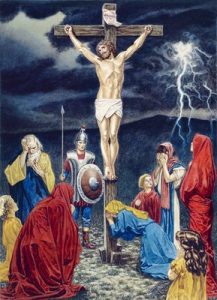Interceding For Our Persecutors
Jesus said, “Father, forgive them, for they don’t know what they are doing.” And the soldiers gambled for his clothes by throwing dice. Luke 23:34 NLT
It may seem hard to pray for God to forgive and bless our enemies, but it’s a healing balm for us as well as for them. I once heard a preacher on the radio say that you cannot feel bitterness while praying for God to lavishly bless your enemy. I did not believe it, but when I tried it, I found it to be true. After all, hasn’t God been extravagantly gracious and forgiving to us? Shouldn’t He give our enemy as much grace as He has given us? Shouldn’t we beg God to be as merciful to our enemy as He has been to us? I suppose I am using the term “enemy” loosely. It may not necessarily be an enemy but may be a friend who annoys us or a family member who frustrates us. Or it could be an outright enemy.
In 1979 at an Oklahoma radio station Wade Watts, a black minister, met Johnny Lee Clary, a KKK member, to discus racial issues between blacks and whites. Clary was full of hate, but Watts let him know, “You can’t do enough to me to make me hate you. I’m gonna love you and I’m gonna pray for you, whether you like it or not.” Clary did everything he could to test Watt’s love. He even burned his church down! Watts simply reminded him that there was nothing he could do to make him hate him, and he was going to ask God to forgive him for being stupid! You can read more about this amazing story here, but in the end instead of Clary getting Pastor Watts to hate him, Pastor Watts got Clary to love Jesus! Watts’ unconditional love and intercessory prayer changed the heart of a KKK member. Not only did Watts not hate Clary, but when Clary gave his heart to Jesus, the two actually became friends and worked in ministry together! By the way, Wade Watts was the uncle of J.C. Watts who is a former Oklahoma congressman as well as a former star quarterback for Oklahoma University.
Jesus was not the only biblical example of someone interceding for another who hurt them. When Miriam was disrespecting Moses, she was struck with leprosy from God. How did Moses react? Did he celebrate? No! The first thing out of his mouth was,
“O God, I beg you, please heal her!” Numbers 12:13 NLT
Years later Paul said,
For God was in Christ, reconciling the world to himself, no longer counting people’s sins against them. And he gave us this wonderful message of reconciliation. 2 Corinthians 5:19 NLT
Moses appreciated the reconciling love of God and wanted Miriam to be reconciled as well. Everyone who experiences the reconciling love of God will be given the ministry of reconciling others to God. To a heart subdued by the love of Christ it is not a chore but rather Paul describes it as a “wonderful message.”
In the story of Job, Eliphaz was not the best friend to Job and also misrepresented God. In the end God told Eliphaz to offer a sacrifice, but it would only be accepted because of Job’s intercessory prayer on behalf of Eliphaz.
My servant Job will pray for you, and I will accept his prayer on your behalf. Job 42:8 NLT
What an illustration of the power of intercessory prayer! Eliphaz will be accepted because of the prayer of Job. Not only did Job’s prayer bring healing to Eliphaz; it brought healing to Job himself.
When Job prayed for his friends, the Lord restored his fortunes. In fact, the Lord gave him twice as much as before! Job 42:10 NLT
Paul, who speaks of the ministry of reconciliation, had much to be thankful for concerning Stephen’s intercessory prayer as he was being stoned to death. Paul, who was called Saul at the time, received the coats of the men who stoned Stephen, showing he gave his blessing for the the stoning and thus was just as guilty as those throwing the stones. Did Stephen pray for retaliation? No. He prayed,
“Lord, don’t charge them with this sin!” And with that, he died. Acts 7:60 NLT
By interceding for his murderers Stephen reflected the unconditional love of Jesus. In a grief recovery class I was teaching, a few members expressed sorrow that they hurt someone who died suddenly before that person could forgive them. That is when I realized the significance of Jesus and Stephen forgiving their tormentors as they died. By having a forgiving attitude if we die while someone owes us an apology they can have peace knowing they were automatically forgiven. Stephen’s intercession and attitude of forgiveness may also have led to the conversion from Saul to Paul. From Moses and Miriam to Watts and Clary and beyond, I suppose all eternity will be filled with stories about how the intercessory prayers of the persecuted led to changed hearts and lives both in this world and the great hereafter.
You may watch the video presentation of this article here.

